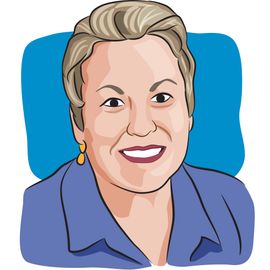- About Us
- Advertise / Support
- Editorial Board
- Contact Us
- CancerNetwork.com
- TargetedOnc.com
- OncLive.com
- OncNursingNews.com
- Terms & Conditions
- Privacy
- Do Not Sell My Information
- Washington My Health My Data
© 2025 MJH Life Sciences™ and CURE - Oncology & Cancer News for Patients & Caregivers. All rights reserved.
Turning the Pages

Kathy LaTour is a breast cancer survivor, author of The Breast Cancer Companion and co-founder of CURE magazine. While cancer did not take her life, she has given it willingly to educate, empower and enlighten the newly diagnosed and those who care for them.
Research for Internet-saavy survivors.
The People Living With Cancer site comes in partnership with the American Society of Clinical Oncology, and the information from its annual meeting in June can be found in podcasts available at www.plwc.org. To find the newest research on survivorship issues, type “survivorship” in the search box.
One of the oldest and best-established cancer organizations in the country is CancerCare, which provides a plethora of services to survivors across the U.S. as well as its home location in New York City. This program provides telephone education workshops on every topic imaginable. CancerCare’s workshop series on survivorship, which includes discussions on neuropathy, joint aches, emotional issues and how to find hope, can be accessed at www.cancercare.org. Also available are podcasts, telephone support groups and an e-newsletter.
The Wellness Community, a support community for cancer patients and their families, celebrated its 25th anniversary this summer. The organization now has 22 Wellness Communities and 56 satellite and off-site programs. Visit its virtual community at www.thewellnesscommunity.org. Right now the community is offering a free guide for women with metastatic breast cancer, entitled “The Patient Active Guide to Living with Advanced Breast Cancer.” If you don’t have Internet access and want a copy, call 1-888-793-WELL (9355).
The Intercultural Cancer Council is now in its seventh year of addressing disparities in cancer prevention, detection and treatment in underserved communities. An active force in gathering the issues, this group invites those interested in joining to visit www.iccnetwork.org/join/. The council has also created many culturally appropriate materials for distribution, including www.mylion.org, a service kit created in partnership with the documentary project A Lion in the House, which addresses childhood cancer. The kit, available online, is designed to help middle schools and high schools motivate youth to take part in service learning projects that will affect children with cancer.
For those of you ready to get involved, the National Coalition for Cancer Survivorship offers self-paced online advocacy training sessions, beginning with explanations of advocacy and its importance. Cancer survivors narrate the training and give examples of ways they have become involved. Sign up for their grassroots program at www.canceradvocacy.org by scrolling toward the bottom of the page and clicking on “Cancer Advocacy Now!”
For the government’s scientific information on complementary therapies, see the National Institutes of Health website for the National Center for Complementary and Alternative Medicine at http://nccam.nih.gov. The NIH is the country’s medical research arm, and the center of complementary and alternative research is one of its newer endeavors. NCCAM has an e-newsletter that looks at complementary research not only for cancer, but for all kinds of ills and ailments. The website is also a good source for consumer alerts about what doesn’t work.
The National Cancer Institute offers its NCI Bulletin in HTML and PDF versions for free. Sign up at www.cancer.gov. This weekly bulletin has updates on research as well as features on issues and clinical trials.
Another fairly new site focuses on prevention. Created by New York-Presbyterian Hospital, www.nypcancerprevention.org is easy to navigate and offers links to clinical trials.
A number of cancer treatment centers have websites, including Memorial Sloan-Kettering Cancer Center (www.mskcc.org). It’s a good site for information on herbs and botanicals in addition to other cancer-related information. The site is a little hard to navigate, but play with the sections and you’ll get it. They also have a free e-newsletter.
The Internet has remarkable resources for survivors. This issue of Heal offers a wealth of websites that can bring you information on a number of survivor-related interests as well as e-newsletters, training, phone support, retreats and virtual community. These resources are all free unless indicated.
Related Content:



